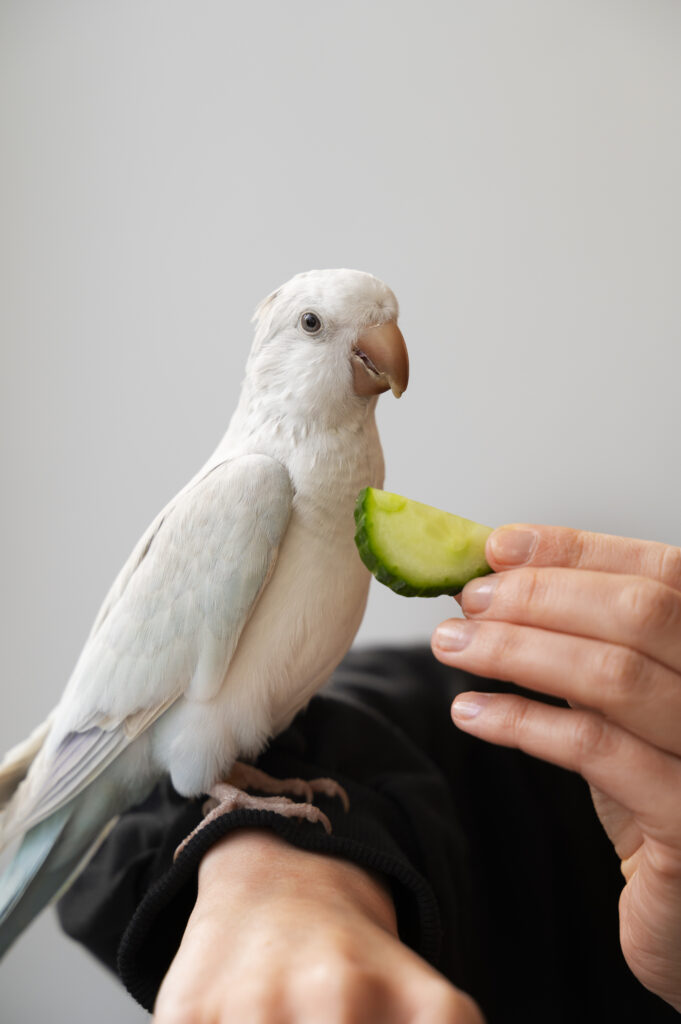Can Birds Eat Human Food? Safe and Unsafe Choices Every Pet Parent Should Know

Feeding our feathered friends can be one of the most joyful parts of pet parenting. Birds, with their quirky personalities, bright feathers, and curious natures, often take a keen interest in what we’re eating. But just because your parrot wants a nibble of your toast, or your budgie is eyeing your apple slice, doesn’t mean all human food is safe for birds.
At High Furries, we understand that birds aren’t just pets—they’re family. Whether you have a parrot, cockatiel, budgerigar, or finch, you want to give them the best care possible. And it all begins with a safe, nutritious diet. That’s why we’re here to help you decode which human foods are safe to share with your avian companion—and which ones to avoid at all costs.
Let’s explore the world of bird nutrition, bust myths, and empower pet parents to make better choices for their winged companions.
Can Birds Eat Human Food?
Yes, birds can eat certain human foods, but with caution. Birds have sensitive digestive systems, and what’s perfectly fine for you might be toxic to them. Some human foods can add variety, nutrients, and enrichment to a bird’s diet, while others can lead to illness—or worse.
Safe Human Foods for Birds
Let’s start with the good news! Here are 10 human foods that birds can safely enjoy in moderation. These options offer nutritional value and make great additions to their diet.
1. Fresh Fruits (Apples, Berries, Melons, Bananas)
Fruits are a natural part of many birds’ diets. They’re packed with vitamins, fiber, and antioxidants.
Serving Tip: Always wash thoroughly and remove seeds or pits (especially apple seeds, which are toxic). Serve in bite-sized pieces.
High Furries Wellness Tip: We help pet parents create personalized fruit charts for their birds, based on species and dietary needs.
2. Leafy Greens (Spinach, Kale, Romaine)
These are packed with nutrients like calcium and vitamin A, which are vital for strong feathers and beak health.
Serving Tip: Offer raw and fresh. Avoid iceberg lettuce—it has little nutritional value.
High Furries Caution: Introduce greens slowly. Our avian health experts can guide you on transitioning safely.
3. Cooked Whole Grains (Brown Rice, Quinoa, Oats)
Whole grains are a good source of fiber and protein. Birds enjoy pecking at these soft, textured foods.
Serving Tip: Serve plain—no salt, butter, or seasonings.
High Furries Idea: Try adding cooked quinoa to your bird’s foraging bowl for a fun, nutritious experience.
4. Carrots and Sweet Potatoes (Cooked or Raw)
Full of beta-carotene, which converts to vitamin A—essential for your bird’s eyesight and immune system.
Serving Tip: Offer grated, steamed, or mashed. Let them play with the texture!
High Furries Advice: Include these weekly in your bird’s diet plan. Ask us for bird-specific meal planning services!
5. Hard-Boiled Eggs (Occasionally)
Eggs are a surprising but nutritious treat for birds, especially during molting or breeding seasons.
Serving Tip: Crumble the egg and offer the crushed shell too—it’s rich in calcium.
High Furries Fact: We offer seasonal dietary plans for breeding birds and molting periods.
6. Nuts (Unsalted & Raw)
Almonds, walnuts, and pistachios are excellent sources of healthy fats and proteins.
Serving Tip: Offer in moderation and never roasted or salted. Always shell and chop for smaller birds.
High Furries Alert: Some birds may have fat-sensitive diets—talk to our specialists before offering nuts regularly.
7. Cooked Legumes (Lentils, Chickpeas, Beans)
Excellent for protein, iron, and fiber.
Serving Tip: Must be cooked thoroughly and served without spices.
High Furries Kitchen Tip: Blend beans with veggies to create a fun mash for your parrot.
8. Whole Grain Bread (Very Small Amounts)
Bread isn’t necessary in a bird’s diet, but a tiny piece of whole grain bread can be a safe snack.
Serving Tip: No butter, spreads, or processed white bread.
High Furries Suggestion: Use bread only as a reward during training or enrichment activities.
9. Cucumbers and Zucchini
Low-calorie, high-hydration treats for hot days!
Serving Tip: Chop into small, soft pieces or offer thin slices.
High Furries Hydration Hack: Cucumber slices are a great treat during summer heatwaves. We offer seasonal care tips for pet parents.
10. Chillies and Bell Peppers
Birds don’t feel the “heat” from chillies due to lacking capsaicin receptors. These are safe and fun for them to eat!
Serving Tip: Offer raw or cooked. Remove seeds if you’re unsure of your bird’s preferences.
High Furries Fun Fact: Chillies are high in vitamin C and can stimulate appetite in picky eaters!

Unsafe Human Foods for Birds
While it’s tempting to share your food, some human foods can be toxic—or even fatal—to birds. Here’s what to keep out of reach:
1. Avocado
Contains persin, a compound that is toxic to birds and can cause heart damage, respiratory distress, and even death.
High Furries Warning: Never feed avocado, even in tiny amounts. We’ve treated cases of avocado toxicity—avoid the risk entirely.
2. Chocolate
Contains theobromine and caffeine, which are extremely harmful to birds.
High Furries Emergency Note: Symptoms include vomiting, seizures, and death. Contact our emergency helpline immediately if ingested.
3. Caffeine (Coffee, Tea, Soda)
Birds’ small bodies react strongly to caffeine. It can cause heart arrhythmias, hyperactivity, and even sudden death.
Keep It Away: No sips of tea or soft drinks. Water is best!
High Furries Rule: If it boosts your energy, it’s a no for your bird.
4. Salt and Salty Snacks
Birds are very sensitive to sodium. A small chip or pretzel can throw off their electrolyte balance.
High Furries Reminder: Never share processed or salty foods. Even a salty cracker can cause dehydration and kidney problems.
5. Alcohol
Even tiny amounts can affect a bird’s liver and neurological system, leading to death.
Absolute No: Keep alcoholic beverages far from your bird’s play area.
High Furries Emergency: Our team offers immediate consultation if your bird consumes alcohol or toxic substances.
Feeding Tips from High Furries Experts
- Moderation Is Key: Even healthy foods should only be 10-15% of the total diet.
- Observe Reactions: New foods should be introduced slowly to watch for allergies or digestive upset.
- Species-Specific Needs: Not all birds have the same diet. Parrots, finches, cockatoos, and budgies have different requirements.
- Customized Bird Diet Plans: At High Furries, we help bird parents build balanced meal plans tailored to your bird’s breed, age, and health condition.
How High Furries Supports You and Your Feathered Friends
At High Furries, we don’t just sell products—we provide personalized consultations, avian health guidance, and dietary planning services for all kinds of birds. Whether you’re a first-time bird parent or have an entire flock, we’re here to help you:
- Understand bird-safe foods and treats.
- Prevent toxic exposures through educational support.
- Manage health conditions like obesity, feather plucking, or vitamin deficiency.
- Create interactive feeding routines that support mental stimulation and foraging behavior.
Our team of avian nutritionists and pet care specialists is always a message or call away.
Take Action for a Healthier, Happier Bird!
Want to create the perfect, safe meal plan for your bird? Worried about what treats are okay? Need help with a picky eater?
Book your personalized bird wellness consultation with High Furries today!
Let’s build a future where your bird is thriving, chirping, and flapping happily—every single day.
Schedule a Free Avian Health Consultation Now
Save & Share This Guide
Loved this article? Bookmark it, print it, or share it with your fellow bird lovers and pet parents. Let’s spread awareness about keeping our feathered family safe and well-fed.
Follow High Furries on Instagram, Facebook & YouTube for expert videos, tips, and adorable bird moments!
